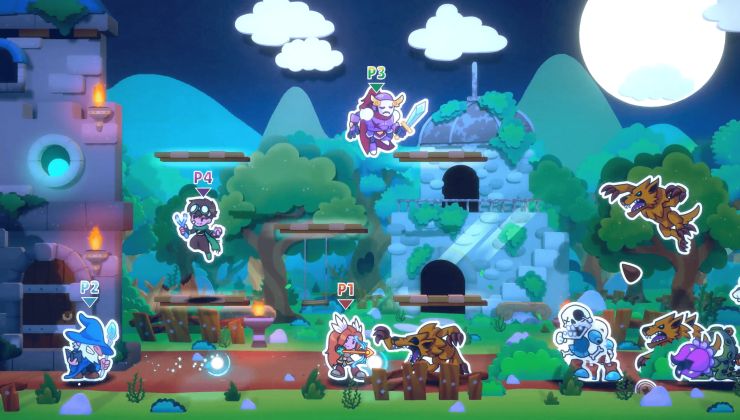Another fresh month and so we have the latest operating system market share details from Statcounter, and it's another impressive showing for Linux from August 2024.
While the latest Steam Survey showed a dip (mainly due to China), Statcounter gives a much wider overall picture based on data from 1.5 million websites.
Here's how things have looked over the last year:
- July 23 - 3.12%
- August 23 - 3.18%
- September 23 - 3.02%
- October 23 - 2.92%
- November 23 - 3.22%
- December 23 - 3.82%
- January 24 - 3.77%
- February 24 - 4.03%
- March 24 - 4.05%
- April - 3.88%
- May - 3.77%
- June - 4.05%
- July - 4.45%
- August - 4.55%
What it looks like since 2009:
See more on Statcounter.
Always nice to see and hopefully it keeps up. It's just one measure of course, but they do have a pretty good sample size. It's not that surprising though. While Windows does still remain top on desktop, it wasn't going to last forever - especially with Microsoft pushing AI more, along with Linux becoming a really good platform for gaming over the last couple of years.
I wish there's better ways to run these statistics, as I know many people including myself either directly or indirectly use browser agent switchers. On Librewolf (what I use), everyone has a Windows user agent by default.
Maybe that's a good thing, if microsoft _thinks_ they are doing fine, they would continue whatever they are doing that is costing them their users :P
I wonder if there's anyone in this world actually "loving" that thing called Microsoft Windows
Ps. Why is ChromeOS not included in that percentage for Linux? ChromeOS is definitely Linux. ChromeOS uses the same core components, but the desktop parts are different.
I wish there's better ways to run these statistics, as I know many people including myself either directly or indirectly use browser agent switchers. On Librewolf (what I use), everyone has a Windows user agent by default.I also use a windows user agent on all my computers and on the computers I installed in my family and friends, and for long (since ~2000) that's why linux is always underestimated on personal computers. Like Steam always asks me a report the ten minute I will be on my dual boot testing if the game that had trouble on my linux is due to OS, while I spend 90% of my (gaming) time on linux.
To get back to the news: As this increase is clearly due to Chineses:
What's happen in China so people are moving into linux that fast? End of windows XP or pirate licences? Some USA's laws on patriotic stuff? Political decision from China's government? Governmental changes in OS making this fast increase in Linux?
Do we know why?
https://gs.statcounter.com/os-market-share/desktop/worldwide/#monthly-202408-202408-map
Bundling with hardware is a solid strategy.
So the question is -- who and how do we pick up more hardware partners?
I talk to people in their 30s who are interested in Gaming Laptops. They are tired of Windows, especially after [Crowdstrike](https://www.urbandictionary.com/define.php?term=Crowdstrike).
I suggest System76, or Framework. For years I have had trouble finding gaming laptops with strong AMD graphics, I trust that has changed?
There is also a large demographic of people that intend to start using Linux but just haven't gotten around to it.
Their catalysts are things like Synology NAS and other homelab hardware.
For years I have had trouble finding gaming laptops with strong AMD graphics, I trust that has changed?
No, not really... Laptops with dedicated AMD GPUs are still pretty rare, and there are no true high-end options, only mid-range options like the 7600M (roughly equivalent to RTX 4060 Laptop). This has been a problem for 10+ years now. At least we can find high-end laptops with AMD CPUs now, which also used to be nearly impossible.
The Zen 5 IGPs are pretty strong though (currently the best ones out there), but they can only match the performance of a desktop GTX 1060 6 GB in best-case scenarios.
My stepson is running ChimeraOS on his gaming machine and I travel with a Raspberry pi 4 to retro game on.
I have personally tried making the switch a few times but so many things didn't work so I ended up on windows 80% of the time anyway and then just gave up. I'm awesome with hardware and can make stuff work fine with most software but absolutely not a programmer. I would rather pull ethernet throughout the house and build my server rack than try to program something.
Hopefully as time goes but and more people are able to make the switch more tools will be available for the people who don't understand the command line.
To get back to the news: As this increase is clearly due to Chineses:I think you have that backward.
but absolutely not a programmertry Linux Mint
while I have done a couple things via terminal and developed a couple scripts for personal use, it was entirely optional to go that route for daily driving that distro over the several years i've been using it in my family's laptops, desktops and miniPCs
- there is a complete liveboot OS on the usb iso
- you'll feel right at home on a traditional desktop design
- it has a GUI for everything
- it works out-of-the-box almost anywhere
- it won't change it's entire looks on a whim
- just the right amount of hand-holding (which is there to guide, not force you)
- auto-updates are optional, unintrusive, light on resources, safe and usually don't even ask for an update (which is never going to force-reboot)
Last edited by Marlock on 3 Sep 2024 at 1:13 am UTC
but absolutely not a programmertry Linux Mint
while I have done a couple things via terminal and developed a couple scripts for personal use, it was entirely optional to go that route for daily driving that distro over the several years i've been using it in my family's laptops, desktops and miniPCs
- there is a complete liveboot OS on the usb iso
- you'll feel right at home on a traditional desktop design
- it has a GUI for everything
- it works out-of-the-box almost anywhere
- it won't change it's entire looks on a whim
- just the right amount of hand-holding (which is there to guide, not force you)
- auto-updates are optional, unintrusive, light on resources, safe and usually don't even ask for an update (which is never going to force-reboot)
Agreed that it's absolutely not necessary to be a programmer. That said, the bigger problem is usually the change in _other_ software.
People who mostly just browse the internet on their computer have the easiest time to switch; the browser is the same *and* their computer doesn't break for no reason (updates, viruses etc).
But people who are used to some (typically windows-only) software find the switch disruptive. That's expected, you need to truly not care about them and be ready to use an alternative (which more commonly than they'd think are actually _better_ software), but most people have a hard time with that (change in general).
So obviously MuttMutt is entitled to not want to change, and while sharing your experience is fine, I hope this doesn't turn into a crusade to get them to switch.
Incidentally, this is also why it's *super* important to get *young people* to grow up with Linux instead of trying to make people change.
Last edited by ShabbyX on 27 Sep 2024 at 5:12 am UTC
I'm hoping more software companies will realize that a 5% market share of over a billion desktop computers is not something they should ignore. Especially considering that first movers will get a chance to establish themselves in this new market. For example, if the Affinity suite would be ported, but the market leader, Adobe, waited until Linux had a 10-15% market share, Affinity would be the #1 professional level creative software on this platform. They could make a lot of money and, more importantly, develop brand loyalty.
Funnily I use Affinity on my setup on a daily basis on Opensuse
My desktop is about the only thing in my house that even has windows on it. And hopefully soon I can dump that as well.
My stepson is running ChimeraOS on his gaming machine and I travel with a Raspberry pi 4 to retro game on.
I have personally tried making the switch a few times but so many things didn't work so I ended up on windows 80% of the time anyway and then just gave up. I'm awesome with hardware and can make stuff work fine with most software but absolutely not a programmer. I would rather pull ethernet throughout the house and build my server rack than try to program something.
Hopefully as time goes but and more people are able to make the switch more tools will be available for the people who don't understand the command line.
Hang in there, I've noticed substantial software developments even just in the last 5 years. And absolute explosion of apps on places like https://flathub.org/ for utilities I never knew existed.
Recently I came across what someone suggested was a alternative to After Effects out of the blue, folks have been making leaps with Affinity Photo 2 working in WINE, and other fascinating developments.
I personally had always had more problems in the Debian family over the years, it's hard to put my finger on exactly what or why.
We're still undergoing an absolute explosion of user apps since the launch of the Steam Deck drawing so many in. So my guess would be to not watch the kettle boil, but know that things have been nothing short of phenomenal and are on the upswing.
For years I have had trouble finding gaming laptops with strong AMD graphics, I trust that has changed?
No, not really... Laptops with dedicated AMD GPUs are still pretty rare, and there are no true high-end options, only mid-range options like the 7600M (roughly equivalent to RTX 4060 Laptop). This has been a problem for 10+ years now. At least we can find high-end laptops with AMD CPUs now, which also used to be nearly impossible.
The Zen 5 IGPs are pretty strong though (currently the best ones out there), but they can only match the performance of a desktop GTX 1060 6 GB in best-case scenarios.
Thanks for bringing me up to speed. I had spent (IIRC) 3,500 on a Wacom Mobile Studio pro years ago and was very frustrated over the Nvidia graphics, so much so that I actually had it disabled and used the Intel fallback exclusively on Linux.
My hopes that the Nvidia+Linux Laptop experience had improved at that time were beyond disappointed as I found out. I eventually sold the device because I don't have tons of extra time and mental focus to try to navigate the labyrinth of Nvidia bugs as they covet the secret binary of their driver and leave Linux in the trash.
Since then I've seen several attractive AMD laptops over the years but it's more or less exactly what you've noted -- mid range performance. The price is always excellent, but when I buy a AMD I generally want it to pack a punch and I don't mind spending extra money if quality is going to parallel competitors.
The situation is so bizare you would think that Nvidia has cooked the market to ass AMD out of being able to make competitive laptops through underhanded deals in countries that don't have laws against such a thing.
Having helped a Linux convert with their Razor laptop and dealing with Nvidia this year I can say that the experience is still pretty terrible. Almost none of the greetd greeters work, plugging in an extra monitor and trying to get the scaling to work correctly on each is a nightmare. Sometimes the external screen won't even turn on without unplugging and re-plugging it -- nonsense like that.
And that's what I'm paying the extra money for at least on Desktop -- I pay AMD so I don't have to waste my time having the 2nd class citizen experience that Nvidia provides me with all this broken stuff because they can't take some pennies out of their stock bubble and bother to make me happy with open source things (at least in the past, future behavior will be judged according to what actions if any they do to rectify all their nightmare linux usage scenarios.)
I'll keep my eyes peeled. Intel GPU has been sufficient on Laptops, but by design laptops use less power and the thermals are high due to having x86_64 CPUs -- it will be interesting to see if RISC-V changes this lowering thermals making it possible for stronger GPUs.
I'll keep my eyes peeled. I like Purism's offerings fine, but my next Laptop will likely be a AMD System76 as long as it checks boxes like [ Aluminum ] and it's better than just a rebrand of some barebone. I think even mid range may be enough for me at this point in time -- Steam Deck kindof proves this case & point. Which wasn't always the case -- up until very recently Laptops have been too underwhelming to be serious options for more than internet browsing (for me at least).
Last edited by ElectricPrism on 3 Sep 2024 at 4:49 am UTC
I wish there's better ways to run these statistics, as I know many people including myself either directly or indirectly use browser agent switchers. On Librewolf (what I use), everyone has a Windows user agent by default.I also use a windows user agent on all my computers and on the computers I installed in my family and friends, and for long (since ~2000) that's why linux is always underestimated on personal computers. Like Steam always asks me a report the ten minute I will be on my dual boot testing if the game that had trouble on my linux is due to OS, while I spend 90% of my (gaming) time on linux.
To get back to the news: As this increase is clearly due to Chineses:
What's happen in China so people are moving into linux that fast? End of windows XP or pirate licences? Some USA's laws on patriotic stuff? Political decision from China's government? Governmental changes in OS making this fast increase in Linux?
Do we know why?
China is busy with an economic meltdown, maybe that has something to do with it?
Partly due to western sanctions.It could also come from the strategic goals Xi Jing Ping set for the country.
Partly due to internal anti-trust.
western sanctions:
One of Trumps election points was that he would take on China and he did so.
His successor Biden did continue this line.
HongKong lost its special status.
The chip sanctions have intensified.
Kamala Harris(the vice president) visited Taiwan(which ofcourse angered China)
Biden sent Warships.
The Netherlands forbade ASML to sell less chipmachines to China.
European tarrifs on Chinese electric cars.
Internally:
The boss of AliBaba got "disappeared" crashing its stock value.
Later he got back a lot more XI Jing Ping positive, but the stock value never fully recovered.
AliBaba got broken up, crashing the housing market(apparently they were big in banking)
Angry merchants attack the Temu headquarters for unfair trading practices.
One of those goal is independence from western software and hardware.
This has let them to publish several Ubuntu distros, which subsequently failed for the expected reasons.
Maybe somebody implemented a functional a way of transitioning.
It could also come from new laws and censorship policies against gaming youth(maximum screen time and all that stuff).
This last one I consider the most realistic
To get back to the news: As this increase is clearly due to Chineses:It might be because of the release of Black Myth Wukong and seeing that it's number 1 for the most played game on Steam Deck in August, it might have helped sell more units over there.
What's happen in China so people are moving into linux that fast? End of windows XP or pirate licences? Some USA's laws on patriotic stuff? Political decision from China's government? Governmental changes in OS making this fast increase in Linux?
Do we know why?
Last edited by ToddL on 3 Sep 2024 at 2:21 pm UTC
The interesting thing about the last month is we had the absolutely massive release of Black Myth: Wukong from Chinese developer Game Science. This, naturally, has lead [sic] to a surge in the numbers of people from China playing games and using Steam. And as usual, that pushes the Linux number down because it's just such a massive amount of extra people on Windows.
In other words, more Chinese players on Steam leads to a lower user share for Linux historically.
Last edited by Salvatos on 3 Sep 2024 at 3:20 pm UTC













 How to set, change and reset your SteamOS / Steam Deck desktop sudo password
How to set, change and reset your SteamOS / Steam Deck desktop sudo password How to set up Decky Loader on Steam Deck / SteamOS for easy plugins
How to set up Decky Loader on Steam Deck / SteamOS for easy plugins
See more from me